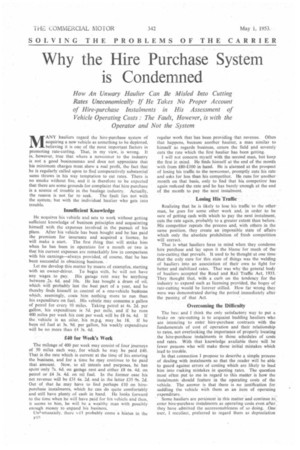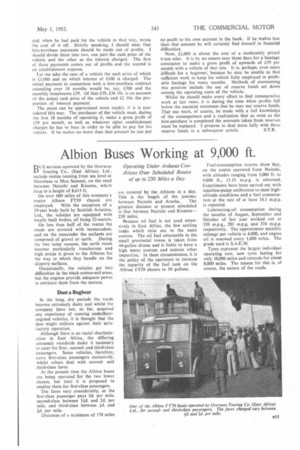Why the Hire Purchase System is Condemned
Page 100

Page 101

If you've noticed an error in this article please click here to report it so we can fix it.
How An Unwary Haulier Can Be Misled Into Cutting Rates Uneconomically, If He Takes No Proper Account of Hire-purchase Instalments in His Assessment of Vehicle Operating Casts: The Fault, However, is with the
Operator and Not the System
MANY hauliers regard the hire-purchase system of acquiring a new vehicle as something to be deplored, believing it is one of the most important factors in promoting rate-cutting. That, in my view, is wrong. It is, however, true that where a newcomer to the industry is not a good businessman and does not appreciate that his minimum charges must show a real profit, the fact that he is regularly called upon to find comparatively substantial sums throws in his way temptation to cut rates. There is no smoke without fire, and it is therefore to be expected that there are some grounds for complaint that hire purchase is a source of trouble in the haulage industry. Actually, the reason is not far to seek. The fault lies not with the system, but with the individual haulier who gets into trouble.
Insufficient Knowledge
He acquires his vehicle and sets to work without getting sufficient knowledge of business principles and acquainting himself with the expenses involved in the pursuit of his plans. After his vehicle has been bought and he has paid the premium for insurance and acquired a licence, he will make a start. The first thing that will strike him when he has been in operation for a month or two is that his current expenses are remarkably low in comparison with his earnings—always provided, of course, that he has been successful in obtaining business.
Let me develop this matter by means of examples, starting with an owner-driver. To begin with, he will not have any wages to pay. His garage rent may be anything between ,2s. 6d. and •-10s. He has bought a drum of oil, which Will probably last the best part of a year, and he thereby finds himself in control of a one-vehicle business which, seemingly, costs him nothing more to run than his expenditure on fuel. His vehicle may consume.a gallon of petrol for every 10 miles. Taking petrol at 4s. 2d. per gallon, his expenditure is 5d, per mile, and if he runs 400 miles per week his cost per week will be £8 6s. 4d. IC the vehicle is an oiler, his m.p.g. may be 18., If he buys oil fuel at 3s. 9d. per gallon:his weekly expenditure will be no more than £4 3s. 4d.
140 for Week's Work The mileage of 400 per week may consist of four journeys of 513 miles each way, for which he may be paid £40. That is the rate which is current at the time of his-entering the business, and for a time he may continue to be paid that amount. Now, to all intents and purposes, he has spent only 7s. 6d. on garage rent and either £8 6s. 4d. on petrol or £4 3s. 4d. on oil -fuel. In the former case his net revenue will be £31 6s, 2d. and in the latter £35 9s 2d. Out of that -kw -may -have to find perhaps £10 on hirepurchase instalments, which he can do quite comfortably andstill have plenty -of cash in hand. He looks forward to the time when he will have paid for his vehicle and then, it seems to him, he will be a wealthy man with .possibly enough money to -expand his business._
Unfnrtunately, there w ill probably come a hiatus in the Fi
regular work that has been providing that revenue. Often that happens, because another haulier, a man similar to himself as regards business, enters the field and severely cuts the rate which the first haulier has been getting.
I will not concern myself with the second man, but keep the first ir mind. He finds himself at the end of the month with from £80-£100 in hand. He is alarmed at the prospect of losing his traffic to the newcomer, promptly cuts his rate and asks for less than his competitor. He runs for another month on that basis, only to find that his competitor has again redLeed the rate and he has barely enough at the end of the month to pay the next instalment.
Losing His Traffic Realizing that he is likely to lose his traffic to the other man, he goes for some other work and, in order to be sure of getting cash with which to pay the next instalment, cuts the rate again, probably to a greater extent than before. His competitor repeats the process and, with others in the same position, they create an impossible state of affairswhich only the absolute prohibition of fresh competition will correct.
That is what hauliers have in mind when they condemn hire purchase and lay upon it the blame for much of the rate-cutting that prevails. It used to be thought at one time that the only cure for this state of things was the welding of hauliers into an association of their own to fight for better and stabilized rates. That was why the general body of hauliers accepted the Road and Rail Traffic Act, 1933.They thought that, with a curb on the tendency for the industry to expand such as licensing provided, the bogey of rate-cutting would be forever stilled. How far wrong they were was demonstrated during the period immediately after the passing of that Act Overcoming the Difficulty The bes:: and I think the only satisfactory way to put a brake on rate-cutting is to acquaint budding hauliers who are intending to enter hire-purchase contracts with the fundamentals of cost of operation and their relationship to rates, not overlooking the importance of properly locating the hire-purchase instalments in those schedules of costs and rates. With that knowledge available there will be fewer persons who will make those initial mistakes which lead to trouble.
In that connection I propose to describe a simple process of dealing with instalments so that the reader will be able to guard against errors of costing which are likely to lead him into riaking mistakes in quoting rates. The question most often put to me in regard to this matter is how the instalments should feature in the operating costs of the vehicle. The answer is that there is no justification for saddling the vehicle with them as an item of operating expenditure.
Some hauliers are persistent in this matter and continueto enter hire-purchase instalments as operating costs even after, they have admitted the unreasonableness of so doing. One user, I recollect, preferred to regard them as depreciation
and, when he had paid for the vehicle in that way, wrote the cost of it off. Strictly speaking, I should state that hire-purchase payments should be made out of profits. I should divide them into two, one part the cash price of the vehicle and the other as the interest charged. The first of these payments comes out of profits and the second is an establishment expense.
Let me take the case of a vehicle the cash price of which is f1.000 and on which interest of £100 is charged. The initial payment in connection with a hire-purchase contract extending over 18 months would he, say, i'300 and the monthly instalments £39. Of that £39, £36 10s. is on account of the actual cash price of the vehicle and £2 10s. the proportion of interest payment.
The point can be appreciated more readily if it is considered this way. The purchaser of the vehicle must, during the first 18 months of operating it, make a gross profit of £39 per month, as well as whatever °per establishment charges he has to bear in order to he able to pay for his vehicle. If he makes no more than that amount he can put no profit to his own account in the bank. If he makes less than that amount he will certainly find himself in financial difficulties.
Now, £1,000 is about the cost of a moderately priced 6-ton oiler. It is by no means easy these days for a haulage contractor to make a gross profit of upwards of £39 per month with a vehicle of that size. It is, perhaps, even more difficult for a beginner, because he may be unable to find sufficient work to keep his vehicle fully employed in profitable haulage for many months. Methods of overcoming this position include the use of reserve funds set down among the operating costs of the vehicle.
Whilst he should make every effort to find remunerative work at fair rates, it is during the time when profits fall below the essential minimum that he may use reserve funds. That use must, of course, be made with a full knowledge of the consequences and a realization that as soon as the hire-purchase is completed the amounts taken from reserves must be replaced. I propose to deal more fully with these reserve funds in a subsequent article. S.T.R.








































































































































































































































